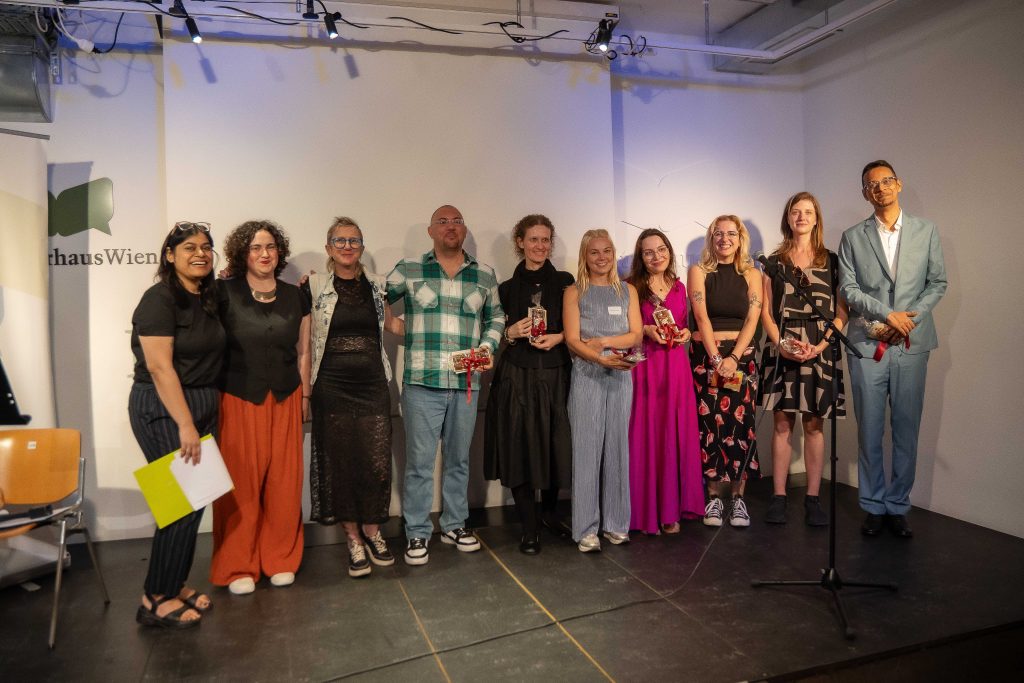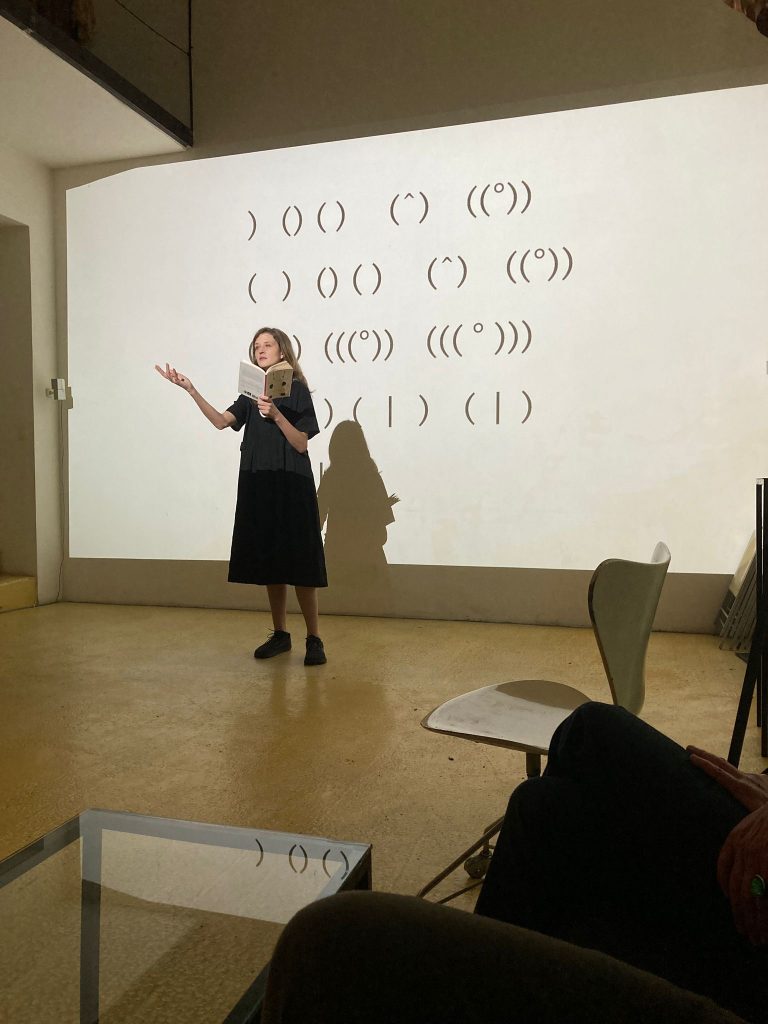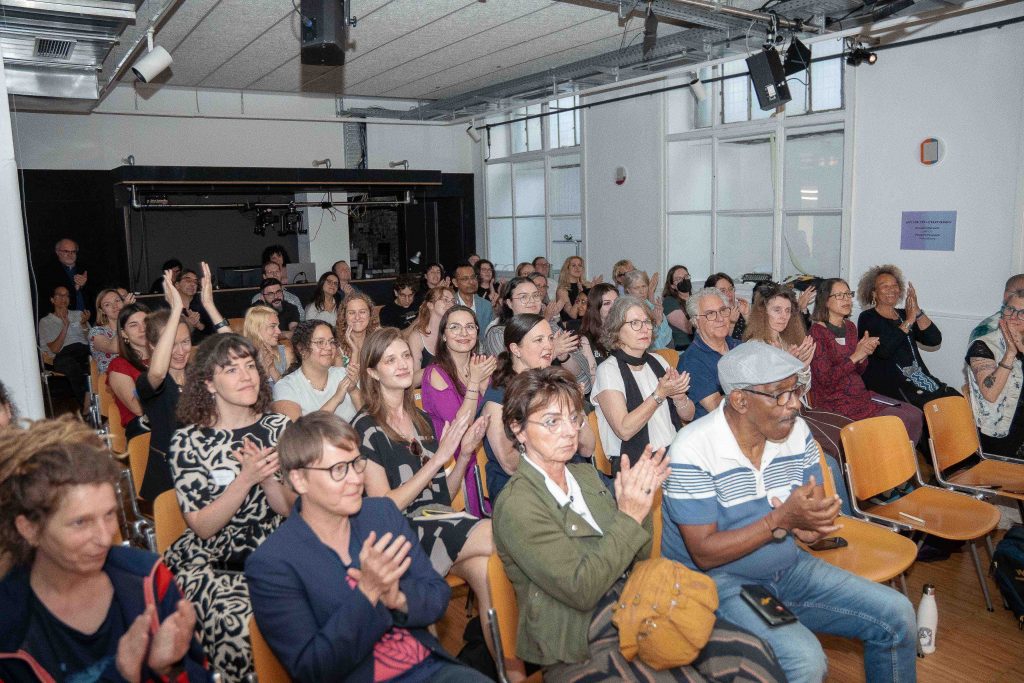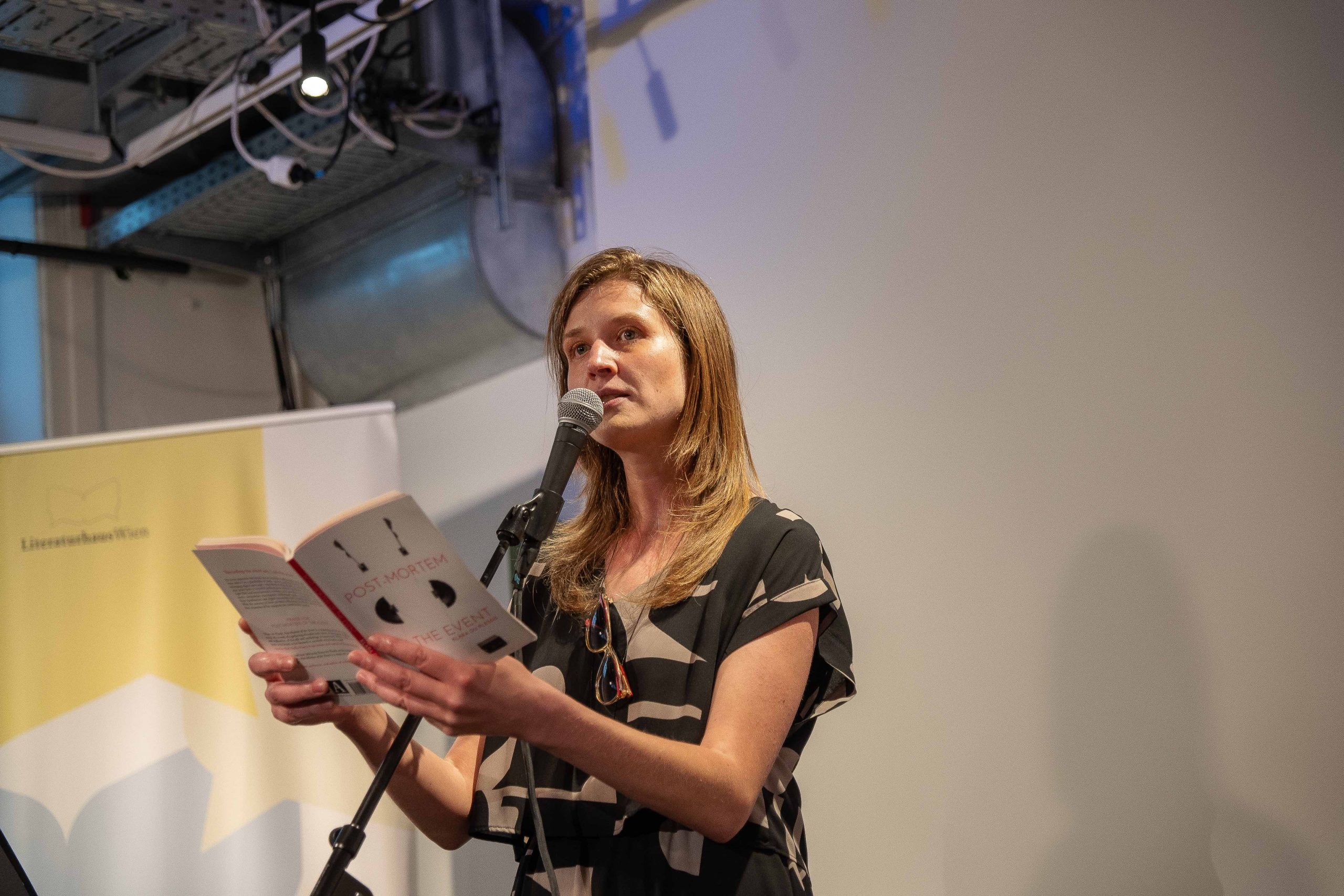Klara du Plessis reading from Post-Mortem of the Event at the “Poetry Off the Page” Open Mic. (Credit: Tsepang Malephane
By Klara du Plessis (SpokenWeb UBCO Postdoctoral Fellow 2024-26)
In my research and practice, the live performance of poetry and the study of poetry in performance are closely intertwined. This is also true of the “Poetry Off the Page, Around the Globe: Advances in Poetry Performance Research” conference that I was fortunate to attend and present at, 13 and 14 June 2025 at the University of Vienna and the Literaturhaus Wien in Vienna, Austria. The final annual instalment of a five-year project, directed by Dr. Julia Lajta-Novak (University of Vienna), Poetry Off the Page, according to its own statement of intent, “investigates the significance of poetry performance to recent British and Irish literary history” (Poetry Off the Page website), bringing together practitioners and interdisciplinary scholars relating their study to the sounding of literature. As someone who has been associated in various capacities with the SSHRC SpokenWeb Partnership and the Audio Media Poetry Lab in a Canadian context since 2018, Poetry Off the Page felt like a kindred scholarly network representing adjacent cultural and literary heritage from across the oceanic divide.

The two keynote speakers were Shantanu Anand, co-founder of the Airplane Poetry Movement (India), and Dr. Cornelia Gräbner from Lancaster University (U.K.). The former presented a vibrant narrative of a slam poetry community developing in India over the past 15 years, one inspired by an Urdu tradition of poetry recitation called Mushaira that impressively draws thousands of attendees to their performances. Dr. Gräbner offered a more theoretical paper, discussing the emergent intersection of practices and methodologies for studying poetry in performance in Anglophone and Hispanic contexts. Contributions by emerging scholars were especially impressive. Sonja Faaren Ruud (KU Leuven), for example, presented ethnographic research based on poetry series in Brussels, Belgium, to consider what is lost and what is gained in the affective and embodied resonances implicit to multilingual poetry performance before audiences who do not necessarily understand all the languages used. Eleonora Fisco (Universities of L’Aquila and Lausanne) studied the function of translation in bilingual poetry slam contests, offering an analytic of different strategies and their respective pros and cons. I presented a paper on archival permissions relating to the audio cassette tapes of the 1994 Writing Thru Race conference (see my earlier blog post here).
The conference also centered live practice and the first evening concluded with a regulated open mic event that featured four, international spoken word headliners—Shantanu Anand (India), Liz Breslin (New Zealand), Raphael D’Abdon (South Africa), and Katharina Wenty (Austria)—and four additional readers chosen by lottery from the conference participants. I was one of the latter performers, sharing work from my then most recent poetry collection, Post-Mortem of the Event (Palimpsest Press, 2024). The room at the Literaturhaus Wien was packed after a day of panel discussions.

Beyond the purview of the conference itself, I was fortunate to feature in another event on 16 June 2025, organized in collaboration with Viennese media artist Christina Goestl. Goestl and I had originally crossed paths through the 2023 SpokenWeb institute hosted at the University of Alberta. We stayed in touch, so when she decided to compile a new artist’s book called fish on a walk*, she invited me to write an introductory essay about her work. This publication, slim and minimalist in scope, yet expertly designed and printed on paper specially sourced from Italy, offered the opportunity of a launch event in Vienna. Against the backdrop of Goestl’s video work projected on the wall of the theories.in.mind gallery space, I performed one of my most off the page works to date.
“Openwork,” literally meaning ornamental lace-making, manipulates multiple recordings of live events based on an earlier poetry collection, Hell Light Flesh (Palimpsest Press, 2020), to create an intertextual found poem resonant with language from past performances. Hell Light Flesh was launched during the COVID19 pandemic and I hosted three x 5-person events in Montreal’s Jarry Park. Each gathering followed the same conversational cues and relied on readings of the same passages from the collection. As such, the three audio recordings of these gatherings had some thematic touch-points, even as they diverged and digressed according to the contributions of a different group of people. Composing this piece meant that I overlaid the three recordings, transcribed the triple audio file with a digital application and then used the found, polyvocal text to create a new work, both interrelated with the past and engaging with literary performance in new thematic ways including aesthetics, political violence, and sociality. The method of composition greatly influences how I perform it as I deliberately amplify the fragments of multiple voices latently present in the text. Hand gestures assist in creating a continuity through a disjunctive text, looping fragments together and also generating a sense of rhythm throughout. Timestamped to maintain an awareness of the sonic documentation at play within the pages of the print book, “Openwork” systematically erodes itself and perforates text as it appears on the page, towards its finale that loses overt semantic meaning, existing as an affective eruption of vowel sounds.

Concluding with a series of zeros and o’s, this work encodes itself into a project of its own vocalization. The sounds themselves veer away from their representational value (that is, legible and recognizable words on the page) as they become articulated more as score than text, more as suggestion towards interpretation than as meaning. Existing within the larger context of my travel to a scholarly conference that invited active engagement with live performance, my performance—existing at the margins of this institutional gathering—embodied its very tenets, simultaneously abstracting itself into the symbolic value of an intellectual sphere.


